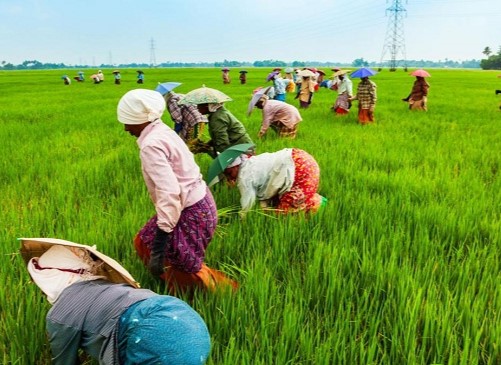
As Nigeria struggles with food insecurity and rising hunger, experts emphasize that large-scale technology adoption, affordable credit access, and a holistic systems approach are critical to transforming the nation’s agricultural sector. These insights emerged at a recent industry conference where stakeholders called for strategic reforms to enhance productivity and reduce reliance on food imports.
Kola Masha, Managing Director of Babban Gona, highlighted agricultural finance as a crucial factor in unlocking Nigeria’s vast agricultural potential. He underscored the need for structured agrifinance models that can empower smallholder farmers, drive wealth creation, and strengthen agricultural value chains.
“Agri-finance has the potential to transform industries by fixing broken value chains,” Masha stated. “However, high lending rates—often exceeding 30%—make agriculture unviable for smallholder farmers.”
He urged financial institutions to adopt Banking as a Service (BaaS) models to integrate seamlessly with farmers and agro-processors. Additionally, he called for policy reforms to make agriculture more attractive to private investment.
Oluwatosin Ojo, a partner at Sahel Capital, stressed that agriculture operates as an interconnected system, yet stakeholders often work in silos, preventing a unified solution to financing challenges.
“We need a system where all processes within the agricultural value chain are interconnected,” Ojo explained. “Investors hesitate to finance individual farmers due to risks such as climate change and supply chain disruptions. Without an integrated value chain approach, financing will continue to be lost.”
Femi Adekoya, founder of Integrated Aerial Precision, emphasized the transformative role of technology in modern farming. He noted that tools like drone technology and precision farming could significantly enhance efficiency, reduce manual labor, and increase yields.

“Technology saves time, improves productivity, and shields farmers from exposure to hazardous chemicals and crop diseases,” Adekoya said. “For instance, with drones, farmers can plant on over 100 hectares of farmland in a day while monitoring crop health in real time.”
Godson Ohuruogu, CEO of TracTrac Mechanisation Services Limited, identified the shortage of tractors as a major limitation in Nigeria’s agricultural sector. He called for government-backed incentives to boost local tractor manufacturing and provide farmers with the capacity to adopt mechanized farming.
“Nigeria’s tractor deficit is restricting food production. Without addressing this issue, achieving large-scale agricultural productivity will remain a challenge,” he warned.
John Alamu, Group Managing Director of Johnvents Industries, raised concerns about the low involvement of young Nigerians in agriculture. He stressed that innovation-driven youth participation could introduce new solutions to climate-related agricultural challenges.
“With over 60% of Nigeria’s population being youth, increasing their engagement in agriculture could revolutionize the sector and drive sustainable growth,” Alamu noted.
Kabir Ibrahim, National President of the All Farmers Association of Nigeria (AFAN), pointed out that achieving food security requires a robust infrastructure framework and improved security conditions.
“We cannot discuss food systems without addressing power, transportation, and security. These are the backbone of agricultural productivity,” Ibrahim emphasized.
Ayoola Oduntan, Group Managing Director of Amo Farm Sieberer Hatchery Limited, reinforced the importance of prioritizing agriculture in Nigeria’s national development agenda. He stressed the need for measures to minimize post-harvest losses and optimize food production.
“Nigeria has the potential to go beyond self-sufficiency and become a global player in food production,” Oduntan asserted.
For Nigeria to attain food security, a multi-pronged approach involving technology adoption, financial reforms, and systemic policy adjustments is necessary. Addressing key challenges—such as access to credit, mechanization, and infrastructure—will pave the way for a more resilient and productive agricultural sector. With the right strategies in place, Nigeria can harness its agricultural potential and emerge as a key player in global food markets.


